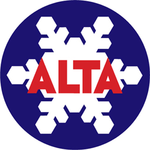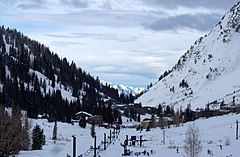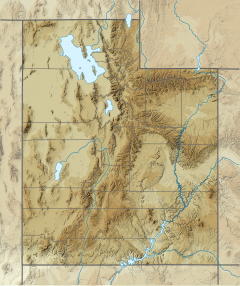Alta is a ski area in the western United States, located in the town of Alta in the Wasatch Mountains of Utah, in Salt Lake County. With a skiable area of 2,614 acres (10.58 km2), Alta's base elevation is 8,530 ft (2,600 m) and rises to 11,068 ft (3,374 m) for a vertical gain of 2,538 ft (774 m). One of the oldest ski resorts in the country, it opened its first lift in early 1939.[2] Alta is known for receiving more snow than most Utah resorts,[3] with an average annual snowfall of 545 inches (13.8 m).[4] It is also regularly ranked as having the best snow in North America.[5][6][7] Alta is one of three remaining ski resorts in the U.S. that prohibit snowboarders, along with nearby competitor Deer Valley and Vermont's Mad River Glen.[8]
| Alta | |
|---|---|
 | |
 | |
Location in Utah | |
| Location | Alta, Utah, U.S. |
| Nearest major city | Sandy, Utah, U.S. |
| Coordinates | 40°34′51″N 111°38′14″W / 40.58083°N 111.63722°W |
| Vertical | 2,538 ft (774 m) |
| Top elevation | 11,068 ft (3,374 m) |
| Base elevation | 8,530 ft (2,600 m) |
| Skiable area | 2,614 acres (10.58 km2) |
| Trails | 116+ total |
| Lift system | 7 chairlifts 1 high speed six pack 3 high speed quads 1 fixed grip quad 1 triple 1 double 5 surface tows. |
| Terrain parks | 0 |
| Snowfall | 545 in (45.4 ft; 13.8 m) |
| Snowmaking | yes |
| Night skiing | none |
| Website | Alta.com |
History
editEarly history
editAlta is one of the oldest ski areas in the U.S. and is one of just three ski areas in the U.S. that prohibit snowboarders. Located at the head of Little Cottonwood Canyon in Albion Basin and Collins Gulch, barely 30 miles (48 km) from the Great Salt Lake, Alta resides in a unique micro climate characterized by over 547 inches (1,390 cm) of high volume, low moisture snowfall annually.[9]
Alta Ski Area features long, straight, fall-line pitches. Among the most well known are Alf's High Rustler, Eddie's High Nowhere, Stone Crusher and the Baldy Chutes. Though widely respected as one of the most challenging in-bounds ski areas in the world, Alta has always viewed itself as a local's and family oriented ski area.
The community of Alta was established in 1871 as an offshoot of the silver mining operations in Little Cottonwood Canyon. A fire destroyed most of the town in 1878, then a cataclysmic avalanche in 1885—combined with the decline of mining—heralded a period of dormancy for the town. The area experienced a modest resurgence in mining in the 1900s, but the town declined again shortly thereafter, and was deserted with the exception of a few hardy miners who continued to intermittently prospect the area.[10]
In 1935 the U.S. Forest Service retained the noted skier Alf Engen to hike into the area and determine its potential as a future ski area. Engen's reports expressed great promise for the area,[11] and recommended the purchase of additional surrounding lands to form the ski area.[citation needed] In 1937 a prominent Salt Lake City lawyer, Joe Quinney, along with other local businessmen, formed the Utah Winter Sports Association to oversee the development of skiing at Alta. In the following year construction began on the original Collins chairlift, fashioned from a surplus mining ore tramway system that featured a clamp-cam bullwheel gripping a metal cable strung with single-seat chairs. It was the second such chairlift in the United States, after Sun Valley. Alta opened to skiers for the first time in 1939 on January 15,[2][3] offering a single ride on the chair for 25 cents.
Recent Developments
editAlta installed its first triple in 1991, by upgrading the Germania double chair. The resort began adding a developed snowmaking infrastructure in 1996, and the ski area continues to develop and refine the process. The late 1990s and early 2000s were marked by further modernization. In 1999 the Sunnyside lift was replaced with a detachable triple chair, the resort's first detachable chairlift. Two years later the Supreme chair was upgraded to a triple, and the Sugarloaf chair was replaced with a detachable quad. In the summer of 2004, the Collins double lift and Germania triple lifts were replaced with a single two-stage detachable quad going from the base of the former Collins lift to the top terminal of the former Germania lift. During the 2007–08 season, Alta introduced a new Axess RFID electronic lift ticket system, similar to that of the Solitude Ski Resort. During the 2008–09 season, Alta added a conveyor system at the start point of the Supreme lift that assists skiers in loading. Alta added safety bars to Sunnyside in 2010 and to Collins, Sugarloaf, and Supreme in the summer of 2011. For the 2017–18 season, Leitner-Poma built a high speed quad that replaced the former Supreme and Cecret lifts, extending from the Sugarloaf base area to the top terminal of the former Supreme lift. For the 2022-23 season, Leitner-Poma constructed a high speed six pack to replace the Sunnyside and Albion lifts.
Future Developments
editThe ski area is in the process of planning for the next several years.[when?] Proposed developments include a tram to the top of Mt. Baldy, a lift from the Sugar Bowl to Sugarloaf Pass, and improvements to parking.[12]
On January 15, 2014, a group called Wasatch Equality[13] and four individual snowboarders filed a lawsuit in the United States District Court for the District of Utah against Alta Ski Area and the United States Forest Service, seeking to permanently disallow Alta from enforcing its anti-snowboarder policy and snowboarding ban. Alta Ski Area prevailed in the ruling and continues to exclusively serve skiers.[14]
Climate
editSugarloaf Mountain (Utah), 11,051 ft (3,368 m),[15] is a high peak within the Alta Ski Area. Sugarloaf Mountain has a subalpine climate (Köppen Dfc), bordering on an Alpine climate (Köppen ET). There is no weather station at the summit, but this climate table contains interpolated data for an area around the summit.
| Climate data for Sugarloaf Mountain (Alta) 40.5641 N, 111.6236 W, Elevation: 10,482 ft (3,195 m) (1991–2020 normals) | |||||||||||||
|---|---|---|---|---|---|---|---|---|---|---|---|---|---|
| Month | Jan | Feb | Mar | Apr | May | Jun | Jul | Aug | Sep | Oct | Nov | Dec | Year |
| Mean daily maximum °F (°C) | 26.1 (−3.3) |
27.3 (−2.6) |
32.2 (0.1) |
38.1 (3.4) |
47.5 (8.6) |
59.0 (15.0) |
68.3 (20.2) |
66.6 (19.2) |
57.8 (14.3) |
44.8 (7.1) |
33.3 (0.7) |
26.4 (−3.1) |
44.0 (6.6) |
| Daily mean °F (°C) | 17.9 (−7.8) |
18.1 (−7.7) |
22.7 (−5.2) |
27.8 (−2.3) |
37.0 (2.8) |
47.6 (8.7) |
57.1 (13.9) |
55.7 (13.2) |
47.3 (8.5) |
35.1 (1.7) |
24.8 (−4.0) |
18.1 (−7.7) |
34.1 (1.2) |
| Mean daily minimum °F (°C) | 9.8 (−12.3) |
8.9 (−12.8) |
13.3 (−10.4) |
17.6 (−8.0) |
26.4 (−3.1) |
36.1 (2.3) |
45.9 (7.7) |
44.8 (7.1) |
36.7 (2.6) |
25.4 (−3.7) |
16.2 (−8.8) |
9.8 (−12.3) |
24.2 (−4.3) |
| Average precipitation inches (mm) | 7.05 (179) |
6.03 (153) |
6.09 (155) |
5.91 (150) |
4.32 (110) |
1.95 (50) |
1.32 (34) |
2.11 (54) |
2.83 (72) |
4.13 (105) |
5.18 (132) |
6.08 (154) |
53 (1,348) |
| Source: PRISM Climate Group[16] | |||||||||||||
The Ski Area
editThe ski area is owned by multiple individuals, with the largest shares being held by the Laughlin family (51%), the Quinney family (25%), and the Bass family (11%).[17] The hotels at the base are all independently owned and not a part of Alta.
Partnership with Snowbird
editBeginning in the winter of 2002, Alta and its neighbor, Snowbird, began offering a joint day pass and a joint season ticket, allowing skiers to fully access all of the terrain of both resorts. The offer coincided with the opening of a new lift in Mineral Basin, a large bowl owned by Snowbird on the back of Snowbird's Hidden Peak and Alta's Sugarloaf mountains, that allowed access to Alta. Other access points between the two resorts exist as well. (Due to Alta's skiers-only policy, the offer is not open to snowboarders.)
Lifts
editAlta currently has eight lifts. Three are located in Albion Basin, two are located in Collins Gulch, one transfers skiers between the two base areas, and the remaining two access hotels.
| Lift Name | Length | Vertical | Type | Make | Year Installed |
|---|---|---|---|---|---|
| Collins | 6,296 ft | 1,840 ft | High speed quad | Doppelmayr CTEC | 2004 |
| Rustler | 475 ft | 85 ft | Triple | Garaventa CTEC | 1999 |
| Snowpine | 487 ft | 85 ft | Fixed grip quad | Skytrac | 2018 |
| Sugarloaf | 5,042 ft | 1,371 ft | High speed quad | Garaventa CTEC | 2001 |
| Sunnyside | 4,730 ft | 810 ft | High speed six pack | Leitner-Poma | 2022 |
| Supreme | 5,134 ft | 1,224 ft | High speed quad | Leitner-Poma | 2017 |
| Transfer Tow | 2,482 ft | 108 ft | Platter | Yan | 1992 |
| Wildcat | 4,268 ft | 1,226 ft | Double | Yan | 1980 |
-
A view of Alta from near White Squaw Area
Terrain aspects
edit- North: 53%
- East: 17%
- West: 29%
- South: 1%
Source:[18]
References
edit- ^ "Mountain Stats". Alta.com. Retrieved January 4, 2018.
- ^ a b Grass, Ray (March 9, 1999). "Alta at 60". Deseret News. p. D1.
- ^ a b "Alta: Resorts: Ski Utah: The Greatest Snow on Earth". www.skiutah.com. Archived from the original on 7 February 2009. Retrieved 2009-01-26.
- ^ "ALTA, UTAH - Climate Summary". wrcc.dri.edu.
- ^ ZRankings. "North America's Best Snow for Ski Resorts". ZRankings. Retrieved 2023-05-26.
- ^ "Weather to ski's top 10 snow-sure ski resorts – North America". www.weathertoski.co.uk. Retrieved 2023-05-26.
- ^ Hodgson, Todd (2020-07-15). "Top 10 Ski Resorts for Snowfall in North America". Ski Mag. Retrieved 2023-05-26.
- ^ Del Sole, Christopher. "Resorts That Ban Snowboarding". snowboarding.about.com. Archived from the original on 2009-08-23. Retrieved 2009-02-08.
- ^ Hamilton, Linda (January 19, 1989). "Secret ingredient, storm patterns make Alta special". Deseret News. p. D1.
- ^ Grass, Ray (January 19, 1989). "Alta". Deseret News. (at 50). p. D1.
- ^ "Alta ski resort | SKIREBEL Magazine". Archived from the original on 2014-04-24. Retrieved 2013-05-03.
- ^ "Welcome to Woody Creek, Colorado". Welcome to Woody Creek, Colorado.
- ^ Wasatch Equality web site
- ^ "Wasatch Equality, et al v. Alta Ski Lifts, et al".
- ^ "Sugarloaf Peak". Summitpost.org. Retrieved November 6, 2023.
- ^ "PRISM Climate Group, Oregon State University". PRISM Climate Group, Oregon State University. Retrieved November 6, 2023.
To find the table data on the PRISM website, start by clicking Coordinates (under Location); copy Latitude and Longitude figures from top of table; click Zoom to location; click Precipitation, Minimum temp, Mean temp, Maximum temp; click 30-year normals, 1991-2020; click 800m; click Retrieve Time Series button.
- ^ Diliberto, Gioia (March 22, 1998). "EARNING IT; A Ski Area Without the Extremes". New York Times.
- ^ ZRankings, Top Ski Resorts. "ZRankings Topographical Survey, Ski Terrain at Alta". ZRankings. ZRankings. Retrieved 27 October 2015.
- Shrontz, Duane (1989) Alta: a people's story Alta Ski Lifts Corp OCLC 20835855
- Asmus, Brad (1993) Powder Hound's Guide to Skiing Alta ISBN 0-9631113-0-2
- Engen, Alan (1998) For the Love of Skiing: A Visual History ISBN 0879058676
External links
edit- Official website
- AltaCam – Alta Skiing Info est. 1996
- Alta Skiing Guide Book – The Powder Hound's Guide to Skiing Alta, a 160-page guide book that describes each of the important runs on one of the most challenging mountains in alpine skiing.
- Ski Lifts.org – Alta – current and removed lifts
- Live Webcams

